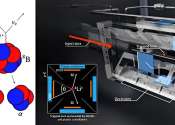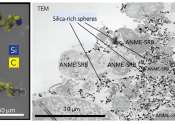The United States Department of Energy (DOE) is a Cabinet-level department of the United States government concerned with the United States' policies regarding energy and safety in handling nuclear material. Its responsibilities include the nation's nuclear weapons program, nuclear reactor production for the United States Navy, energy conservation, energy-related research, radioactive waste disposal, and domestic energy production. DOE also sponsors more research in the physical sciences than any other US federal agency; the majority of this research is conducted through its system of United States Department of Energy National Laboratories.
The agency is administered by the United States Secretary of Energy, and its headquarters are located in southwest Washington, D.C., on Independence Avenue in the Forrestal Building, named for James Forrestal, as well as in Germantown, Maryland.
In 1942, during World War II, the United States started the Manhattan Project, a project to develop the atomic bomb, under the eye of the U.S. Army Corps of Engineers. After the war, the Atomic Energy Commission was created to control the future of the project.
- Website
- http://www.energy.gov/
- Wikipedia
- http://en.wikipedia.org/wiki/United_States_Department_of_Energy
Some content from Wikipedia,
licensed under CC BY-SA
Subscribe to rss feed









